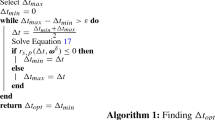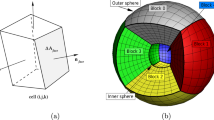Abstract
Multiple high-order time-integration schemes are used to solve stiff test problems related to the Navier–Stokes (NS) equations. The primary objective is to determine whether high-order schemes can displace currently used second-order schemes on stiff NS and Reynolds averaged NS (RANS) problems, for a meaningful portion of the work-precision spectrum. Implicit–Explicit (IMEX) schemes are used on separable problems that naturally partition into stiff and nonstiff components. Non-separable problems are solved with fully implicit schemes, oftentimes the implicit portion of an IMEX scheme. The convection–diffusion-reaction (CDR) equations allow a term by term stiff/nonstiff partition that is often well suited for IMEX methods. Major variables in CDR converge at near design-order rates with all formulations, including the fourth-order IMEX additive Runge–Kutta (ARK2) schemes that are susceptible to order reduction. The semi-implicit backward differentiation formulae and IMEX ARK2 schemes are of comparable efficiency. Laminar and turbulent aerodynamic applications require fully implicit schemes, as they are not profitably partitioned. All schemes achieve design-order convergence rates on the laminar problem. The fourth-order explicit singly diagonally implicit Runge–Kutta (ESDIRK4) scheme is more efficient than the popular second-order backward differentiation formulae (BDF2) method. The BDF2 and fourth-order modified extended backward differentiation formulae (MEBDF4) schemes are of comparable efficiency on the turbulent problem. High precision requirements slightly favor the MEBDF4 scheme (greater than three significant digits). Significant order reduction plagues the ESDIRK4 scheme in the turbulent case. The magnitude of the order reduction varies with Reynolds number. Poor performance of the high-order methods can partially be attributed to poor solver performance. Huge time steps allowed by high-order formulations challenge the capabilities of algebraic solver technology.
Similar content being viewed by others
References
R. Alexander (1977) ArticleTitleDiagonally implicit Runge–Kutta methods for stiff O.D.E.s SIAM J. Num. Anal. 14 IssueID6 1006–1021 Occurrence Handle0374.65038 Occurrence Handle56 #17089
W.K. Anderson D.L. Bonhaus (1994) ArticleTitleAn implicit upwind algorithm for computing turbulent flows on unstructured grids Comp and Fluids 23 IssueID1 1–21
U.M. Ascher S.J. Ruuth B.T.R. Wetton (1995) ArticleTitleImplicit–explicit methods for time-dependent partial differential equations SIAM J. Num. Anal. 32 IssueID3 797–823 Occurrence Handle96j:65076
U.M. Ascher S.J. Ruuth R.J. Spiteri (1997) ArticleTitleImplicit–explicit Runge–Kutta methods for time-dependent partial differential equations Appl. Num. Math. 25 IssueID2–3 151–167 Occurrence Handle98i:65054
H. Bijl M.H. Carpenter V.N. Vatsa C.A. Kennedy (2002) ArticleTitleTime integration schemes for the unsteady Navier–Stokes equations J. Comp. Phys. 179 IssueID1 313–329
J.C. Butcher (1987) The Numerical Analysis of Ordinary Differential Equations, Runge–Kutta and General Linear Methods John Wiley New York
J.C. Butcher (1993) ArticleTitleDiagonally-implicit multi-stage integration methods Appl. Num. Math. 11 IssueID5 347–363 Occurrence Handle0773.65046 Occurrence Handle93m:65084 Occurrence Handle10.1016/0168-9274(93)90059-Z
J.C. Butcher (2001) ArticleTitleGeneral linear methods for stiff differential equations BIT 41 IssueID2 240–264 Occurrence Handle0983.65085 Occurrence Handle2002c:65090 Occurrence Handle10.1023/A:1021986222073
M.P. Calvo J. Frutos Particlede J. Novo (2001) ArticleTitleLinearly implicit Runge–Kutta methods for advection–reaction-diffusion equations Appl. Num. Math. 37 IssueID4 535–549 Occurrence Handle10.1016/S0168-9274(00)00061-1
Carpenter, M. H., Viken, S. A., and Nielsen, E. J. (2003). The Efficiency of High Order Temporal Schemes, AIAA-2003–0086, 41st Aerospace Sciences Meeting & Exhibit, January 2003, Reno, NV
J.R. Cash (1980) ArticleTitleOn the integration of stiff systems of O.D.E.’s using extended backward differentiation formulae Numer. Math. 34 IssueID3 235–246 Occurrence Handle0411.65040 Occurrence Handle82d:65056 Occurrence Handle10.1007/BF01396701
J.R. Cash (1983) ArticleTitleThe integration of stiff systems of O.D.E.’s using modified extended backward differentiation formulae Comp. and Math. with Appls. 9 IssueID5 645–657 Occurrence Handle0526.65052 Occurrence Handle85g:65080
K. Dekker J.G. Verwer (1984) Stability of Runge–Kutta Methods for Stiff Nonlinear Differential Equations North-Holland Amsterdam
K. Gustafsson M. Lundh G. Söderlind (1988) ArticleTitleA PI-stepsize control for the numerical solution of ordinary differential equations BIT 28 IssueID2 270–287 Occurrence Handle89e:65073 Occurrence Handle10.1007/BF01934091
K. Gustafsson (1991) ArticleTitleControl theoretic techniques for stepsize selection in Runge–Kutta methods ACM Trans. Math. Soft. 17 IssueID4 533–554 Occurrence Handle0900.65256 Occurrence Handle1140040 Occurrence Handle10.1145/210232.210242
K. Gustafsson (1994) ArticleTitleControl theoretic techniques for stepsize selection in implicit Runge–Kutta methods ACM Trans. Math. Soft. 20 IssueID4 496–517 Occurrence Handle0888.65096 Occurrence Handle1368027 Occurrence Handle10.1145/198429.198437
K. Gustafsson G. Söderlind (1997) ArticleTitleControl strategies for the iterative solution of nonlinear equations in ODE solvers SIAM J. Sci. Comput. 18 IssueID1 23–40 Occurrence Handle97k:65157 Occurrence Handle10.1137/S1064827595287109
E. Hairer Ch. Lubich M. Roche (1988) ArticleTitleError of Runge–Kutta methods for stiff problems studied via differential algebraic equations BIT 28 IssueID3 678–700 Occurrence Handle90e:65101 Occurrence Handle10.1007/BF01941143
E. Hairer S.P. Nørsett G. Wanner (1993) Solving Ordinary Differential Equations I: Nonstiff Problems Springer-Verlag Berlin
E. Hairer G. Wanner (1996) Solving Ordinary Differential Equations II: Stiff and Differential-Algebraic Problems EditionNumber2 Springer-Verlag Berlin
C.A. Kennedy M.H. Carpenter (2003) ArticleTitleAdditive Runge–Kutta schemes for convection–diffusion–reaction equations Appl. Num. Math. 44 IssueID1–2 139–181 Occurrence Handle2003m:65111
A. Kværnø S.P. Nørsett B. Owren (1996) ArticleTitleRunge–Kutta research in Trondheim Appl. Num. Math. 22 IssueID1–3 263–277
A. Kværnø (2004) ArticleTitleSingly diagonally implicit Runge–Kutta methods with an explicit first stage BIT 44 IssueID3 489–502 Occurrence Handle2005g:65111
J.D. Lambert (1991) Numerical Methods for Ordinary Differential Systems. The Initial Value Problem John Wiley Chichester
Melson, N. D., Sanetrik, M. D., and Atkins, H. L. (1993). Time-accurate Navier–Stokes calculations with multigrid acceleration, Proceedings of the Sixth Copper Mountain conference on multigrid methods, Copper Mountain, Colorado, April, 1993, Melson, N. D., McCormick, S. F., and Manteuffel, T. A. (eds.), NASA publication 3224(2), 423–437
Radakrishnan, K., and Hindmarsh, A. C. (1993) Description of LSODE, the Livermore Solver for Ordinary Differential Equations, NASA RP-1327, LLNL Laboratory Report UCRL-ID-113885, NASA Lewis Research Center, Cleveland, http://www.llnl.gov/CASC/odepack/
P. Roe (1981) ArticleTitleApproximate Riemann solvers, parameter vectors, and difference schemes J. Comp. Phys. 43 357–372 Occurrence Handle0474.65066 Occurrence Handle82k:65055
L.F. Shampine (1994) Numerical Solution of Ordinary Differential Equations Chapman & Hall New York
Spalart, P. R. and Allmaras, S. R. (1992). A one-equation turbulence model for aerodynamic flows, AIAA Paper 92-0439, 30th Aerospace Sciences Meeting and Exhibit, January 1992, Reno, NV
A.A. Townsend (1976) The Structure of Turbulent Shear Flow Cambridge University Press Cambridge
B. Van Leer (1982) Flux vector splitting for the Euler equations E. Krause (Eds) Lecture Notes in Physics, 170. Springer-Verlag Berlin 501–512
V.N. Vatsa B.W. Wedan (1990) ArticleTitleDevelopment of a multigrid code for 3D Navier–Stokes equations and its application to a grid-refinement study Comp. Fluids 18 IssueID4 391–403 Occurrence Handle10.1016/0045-7930(90)90029-W
Verwer, J. G. (1986). Convergence and order reduction of diagonally implicit Runge–Kutta schemes in the method of lines. Griffiths D. ., and Watson, G. A. (eds.), Numerical Analysis, Res. Notes in Math. Ser. 140. Burnt Mill, Harlow, Essex, England: Longman Sci. Tech.; NY., 220–237
Author information
Authors and Affiliations
Rights and permissions
About this article
Cite this article
Carpenter, M.H., Kennedy, C.A., Bijl, H. et al. Fourth-Order Runge–Kutta Schemes for Fluid Mechanics Applications. J Sci Comput 25, 157–194 (2005). https://doi.org/10.1007/s10915-004-4637-3
Received:
Accepted:
Issue Date:
DOI: https://doi.org/10.1007/s10915-004-4637-3




